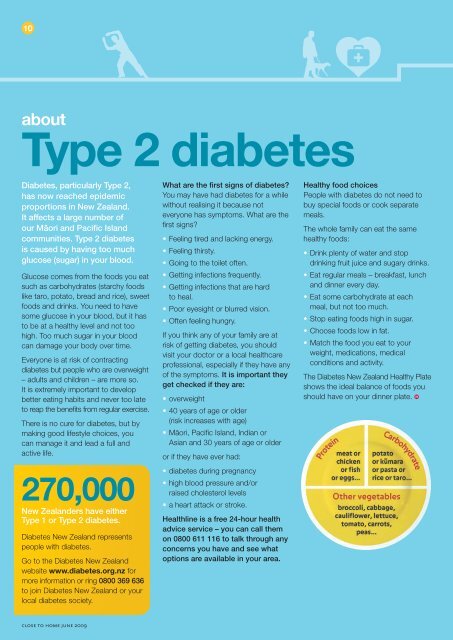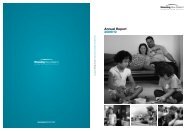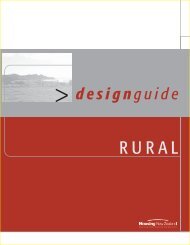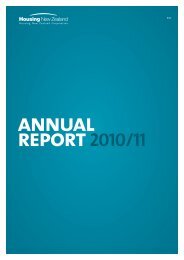Close to Home: Issue 22, June 2009 - Housing New Zealand
Close to Home: Issue 22, June 2009 - Housing New Zealand
Close to Home: Issue 22, June 2009 - Housing New Zealand
Create successful ePaper yourself
Turn your PDF publications into a flip-book with our unique Google optimized e-Paper software.
10<br />
about<br />
Type 2 diabetes<br />
Diabetes, particularly Type 2,<br />
has now reached epidemic<br />
proportions in <strong>New</strong> <strong>Zealand</strong>.<br />
It affects a large number of<br />
our Mäori and Pacific Island<br />
communities. Type 2 diabetes<br />
is caused by having <strong>to</strong>o much<br />
glucose (sugar) in your blood.<br />
Glucose comes from the foods you eat<br />
such as carbohydrates (starchy foods<br />
like taro, pota<strong>to</strong>, bread and rice), sweet<br />
foods and drinks. You need <strong>to</strong> have<br />
some glucose in your blood, but it has<br />
<strong>to</strong> be at a healthy level and not <strong>to</strong>o<br />
high. Too much sugar in your blood<br />
can damage your body over time.<br />
Everyone is at risk of contracting<br />
diabetes but people who are overweight<br />
– adults and children – are more so.<br />
It is extremely important <strong>to</strong> develop<br />
better eating habits and never <strong>to</strong>o late<br />
<strong>to</strong> reap the benefits from regular exercise.<br />
There is no cure for diabetes, but by<br />
making good lifestyle choices, you<br />
can manage it and lead a full and<br />
active life.<br />
270,000<br />
<strong>New</strong> <strong>Zealand</strong>ers have either<br />
Type 1 or Type 2 diabetes.<br />
Diabetes <strong>New</strong> <strong>Zealand</strong> represents<br />
people with diabetes.<br />
Go <strong>to</strong> the Diabetes <strong>New</strong> <strong>Zealand</strong><br />
website www.diabetes.org.nz for<br />
more information or ring 0800 369 636<br />
<strong>to</strong> join Diabetes <strong>New</strong> <strong>Zealand</strong> or your<br />
local diabetes society.<br />
What are the first signs of diabetes<br />
You may have had diabetes for a while<br />
without realising it because not<br />
everyone has symp<strong>to</strong>ms. What are the<br />
first signs<br />
• Feeling tired and lacking energy.<br />
• Feeling thirsty.<br />
• Going <strong>to</strong> the <strong>to</strong>ilet often.<br />
• Getting infections frequently.<br />
• Getting infections that are hard<br />
<strong>to</strong> heal.<br />
• Poor eyesight or blurred vision.<br />
• Often feeling hungry.<br />
If you think any of your family are at<br />
risk of getting diabetes, you should<br />
visit your doc<strong>to</strong>r or a local healthcare<br />
professional, especially if they have any<br />
of the symp<strong>to</strong>ms. It is important they<br />
get checked if they are:<br />
• overweight<br />
• 40 years of age or older<br />
(risk increases with age)<br />
• Ma- ori, Pacific Island, Indian or<br />
Asian and 30 years of age or older<br />
or if they have ever had:<br />
• diabetes during pregnancy<br />
• high blood pressure and/or<br />
raised cholesterol levels<br />
• a heart attack or stroke.<br />
Healthline is a free 24-hour health<br />
advice service – you can call them<br />
on 0800 611 116 <strong>to</strong> talk through any<br />
concerns you have and see what<br />
options are available in your area.<br />
Healthy food choices<br />
People with diabetes do not need <strong>to</strong><br />
buy special foods or cook separate<br />
meals.<br />
The whole family can eat the same<br />
healthy foods:<br />
• Drink plenty of water and s<strong>to</strong>p<br />
drinking fruit juice and sugary drinks.<br />
• Eat regular meals – breakfast, lunch<br />
and dinner every day.<br />
• Eat some carbohydrate at each<br />
meal, but not <strong>to</strong>o much.<br />
• S<strong>to</strong>p eating foods high in sugar.<br />
• Choose foods low in fat.<br />
• Match the food you eat <strong>to</strong> your<br />
weight, medications, medical<br />
conditions and activity.<br />
The Diabetes <strong>New</strong> <strong>Zealand</strong> Healthy Plate<br />
shows the ideal balance of foods you<br />
should have on your dinner plate.<br />
close <strong>to</strong> home june <strong>2009</strong>














